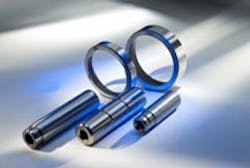Easier-to-Machine, High-Performance Material for Valve Seats
Automotive components manufacturer Federal-Mogul Corp. has developed a new material for valve-seat inserts that it says will make new design initiatives for engines — including smaller units and those that run on high-octane blended fuels — more cost-efficient for manufacturers, while ensuring the engines meet performance and durability standards. The material is a powdered tool steel that is more efficient to machine than conventional alloys because it achieves faster throughput and thus higher productivity in cylinder head manufacturing.
Federal-Mogul is producing this “lean tool steel” now with an unnamed customer, and it is evaluating more applications with additional customers. Also, it is studying the potential for more applications of its new composition for other applications that require high-temperature wear properties, such as turbocharger components.
"The lean tool steel valve seat material demonstrates how Federal-Mogul uses leading technology and innovation to provide customers with cost-effective, eco-friendly products that enable greener, higher efficiency powertrains and more competitive vehicles," stated Rainer Jueckstock, Federal-Mogul senior vice president, Powertrain Energy.
Federal-Mogul supplies powertrain, chassis, and safety systems to many of the world's automotive, light commercial, heavy-duty, agricultural, marine, rail, off-road and industrial vehicle OEMs. It’s also active in the global aftermarket.
"Our metallurgical, process and production expertise has produced an effective solution for a highly complex technical issue," Jueckstock added.
The new tool steel has a higher proportion of chromium than standard tool steels, cost-effectively adding carbides that create a multiple-phase composite microstructure. Valve seat inserts produced from this material achieve comparable wear resistance as concentrated tool steel powders, but with significantly increased machinability.
“The hard phases of the material measure over 1000HV50 on the Vickers hardness scale, while the softer matrix provides for longer tool life when bevel cutting the seats, for example,” according to Federal-Mogul. “This extended tool life enables better production rates for cylinder head machining through faster cutting speeds and higher cutting feed rates.”
The emerging class of automotive engines are smaller and fueled by alternative mixes, and they run at higher temperatures and higher loads, placing greater demands on the valvetrain — particularly on the valve seat insert, Federal-Mogul notes.
To guarantee the hardness and resistance to deformation and wear at elevated temperatures needed for such applications, it would otherwise be necessary to produce the valve seat from a tool steel that contains a relatively high amount of high-cost alloys like molybdenum or tungsten.
Federal-Mogul’s new material is suitable for both aluminum and cast iron cylinder heads and is compatible with gasoline, ethanol, diesel and biodiesel fuel blends, according to Denis Christopherson, Federal-Mogul's R&D manager, valve seats and guides.
"Compared to other existing materials, lean tool steel is easier but more robust to manufacture and helps our customers achieve better cylinder head machining and engine performance. This new material has the potential to become the foundation of our future portfolio of valve seat materials," he said.
